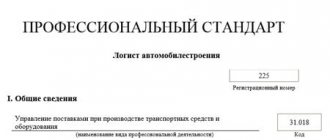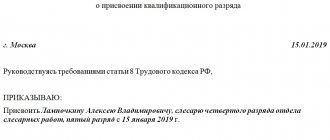Home — Civil procedural law — Specialty accountant, which social category does it belong to?
Civil servant A civil servant is a citizen of the Russian Federation who, in accordance with the procedure established by federal law, performs duties in a civil service position for monetary remuneration paid from the federal budget or the budget of the corresponding constituent entity of the Russian Federation. Civil servants of federal government bodies, government bodies of constituent entities of the Russian Federation, as well as other government bodies formed in accordance with the Constitution of the Russian Federation, are recognized by this Federal Law as civil servants of the Russian Federation.
personnel categories
- Order No. 248n dated May 29, 2008. Establishes qualification levels for employees.
- Order No. 247n dated May 29, 2008. It also establishes qualification levels, but this time relative to managers and specialists.
The regulations highlight these groups of personnel:
- Positions of workers and employees for which no professional education is required.
- Positions that require primary or secondary education.
- Managerial positions that require initial professional education.
- Specialties that require higher education (qualification “bachelor”).
- Positions for which you need to have a higher education with the qualification “certified specialist” or “master”.
The need for education is determined depending on the specifics of the activity.
Categories of accountants according to the Qualification Directory
Currently, public sector enterprises assign an accountant category in accordance with the Qualification Directory of Positions, approved. Resolution of the Ministry of Labor of Russia dated August 21, 1998 No. 37 (as amended on March 27, 2018). For commercial organizations, the directory is advisory in nature. In the future, it is planned to gradually transition the public sector to the use of professional and industry standards, but this is a rather lengthy process.
According to the Qualification Handbook, in order to assign specialists the levels of “accountant”, “accountant of categories 1 and 2”, the following requirements must be met:
Accountant - specialists with secondary vocational education (in an economic profile), without work experience requirements or with special training in accounting programs and at least 3 years of work experience in the field of accounting and control;
Accountant of the 2nd category are specialists with a higher professional (economic) education, without requirements for work experience in their specialty, or secondary vocational education with at least 3 years of work experience in the position of “accountant”;
Accountant of the 1st category are specialists with higher professional education (economics) and work experience of at least 3 years in the position of “accountant of the 2nd category”.
What category of personnel does an accountant belong to?
Line managers are persons acting on the basis of a single principle, responsible for the state and development of the organization or its separate, organizationally formalized part (association, enterprise, workshop, site, team). Functional managers include persons responsible for a specific functional area of work in management system and leading divisions that perform specific management functions (committees, departments, bureaus, etc.) Managers are also classified according to management levels. For example, line managers are managers: grassroots (foremen, heads of sections, workshops, etc.), middle (chiefs of buildings , directors of enterprises, chief specialists of associations) and the highest (chiefs of central departments, ministers, chairmen of committees, etc.) management hierarchy is schematically illustrated in Fig. 8.
Requirements for chief accountants
Chief accountants must now have either a higher education (core or non-core) or secondary vocational education (core or non-core).
If the education is non-core (for example, technical), the applicant will also have to obtain additional professional education. That is, undergo a professional retraining program for accountants.
If you have a higher education, the chief accountant must have at least five years of experience in accounting and financial work. If you have secondary vocational education, at least seven years of accounting and financial work.
The required skills of a chief accountant include the following:
- ability to develop methods of accounting and formulate accounting policies of the organization;
- ability to develop forms of primary accounting documents, accounting registers, reporting forms and draw up a document flow schedule;
- ability to plan volumes and timing of work during the reporting period for reporting purposes;
- ability to assess the materiality of information disclosed in accounting (financial) statements;
- ability to prepare accounting (financial) statements during reorganization or liquidation of a legal entity;
- ability to use computer programs for accounting, information and reference systems, office equipment.
In addition, the new professional standard establishes the obligation for chief accountants to regularly receive additional professional education. In other words, chief accountants are obliged to constantly improve their qualifications.
The volume of the advanced training program for chief accountants must be at least 120 hours over three consecutive calendar years. At the same time, annually the chief accountant is required to devote at least 20 hours to advanced training courses.
What categories are the personnel divided into?
Examples of non-production personnel are workers in housing and communal services, canteens, and clinics. Categories of managers Production managers are divided into these categories:
- Linear. These managers make decisions affecting all functional areas of activity. Examples: general director, technical service manager, workshop manager.
- Nonlinear.
ImportantThese are functional managers who perform specific management functions. Examples: financial director, manager responsible for personnel. Managers are divided by management levels:
Grassroots level.
For example, master.
Lower-level managers manage small departments, middle-level managers manage large departments, and senior managers manage the enterprise as a whole.
Help: Assigning qualification categories to specialists
ASSIGNMENT OF QUALIFICATION CATEGORIES TO SPECIALISTS
Assignment of qualification categories to specialists is carried out in the manner determined by the collective agreement, agreement or employer in accordance with the qualification characteristics of specialist positions provided for by the ECSD, taking into account the recommendations of the certification commission.
When assigning a qualification category, the complexity of the labor functions performed by a specialist, the degree of independence in performing them, his responsibility for the work performed, an initiative and creative attitude to work, the efficiency and quality of work, as well as practical experience determined by length of service in the specialty, professional knowledge and etc. (clause 20 of the General Provisions of the ECSD).
Thus, Article 61 of the Labor Code of the Republic of Belarus provides that the assignment of work performed to specific tariff categories (positions) and the assignment of appropriate qualifications to employees are carried out in the manner determined by a collective agreement, agreement or employer on the basis of qualification reference books approved in the prescribed manner.
Taking into account the specified legal requirement, the organization, on the basis of a local regulatory legal act (for example, regulations on the assignment of qualification categories), establishes a procedure for assigning qualification categories to specialists.
For information
Hiring an employee as a specialist of the 1st or 2nd category cannot serve as a basis for assigning the appropriate qualification to the employee.
A qualification category is considered assigned only if this decision was made at a meeting of the certification commission and approved by order of the employer, and a corresponding entry was made in the employee’s work book.
Qualification categories are assigned to those specialist positions for which the qualification characteristics of the ECSD provide for intra-position categorization, and in the order and on the conditions that are provided for by the relevant qualification requirements. At the same time, specialists who have the education and work experience in the relevant positions provided for in the qualification characteristics are allowed to undergo certification (clauses 22, 23 of the General Provisions of the ECSD).
Example 1
For the position “Accountant”, contained in issue 1 of the ECSD, approved by Resolution of the Ministry of Labor of the Republic of Belarus dated December 30, 1999 No. 159, taking into account changes and additions, the following qualification requirements are provided:
Accountant of the 1st category: higher professional (economic) education and work experience as an accountant of the 2nd category for at least 3 years.
Accountant of the 2nd category: higher professional (economic) education and work experience as an accountant for at least 3 years.
Accountant: higher professional (economic) education without requirements for work experience or secondary specialized education without requirements for work experience.
Taking into account these qualification requirements, an accountant can be assigned the 2nd qualification category only if the employee has work experience as an accountant for at least 3 years, and the 1st qualification category is assigned if he has work experience as an accountant of the 2nd qualification category at least 3 years respectively.
If the qualification requirements provide for additional conditions (for example, for a customs clearance specialist, the employee is required to have a qualification certificate as a customs clearance specialist, as well as undergo advanced training courses for customs clearance specialists once every 3 years), the employer is obliged to take them into account as upon appointment to this position, and upon assignment of a qualification category to this employee. Moreover, the employer may, in accordance with the established procedure, provide, along with the requirements for qualification characteristics, additional requirements for knowledge, professional training, work experience, etc. when assigning a qualification category to specialists in the corresponding field of activity (clause 23 of the General Provisions of the ECSD).
When assigning a qualification category to specialists, the employer has the right, on the basis of a local regulatory legal act, to establish additional requirements along with those existing in the qualification characteristics (for example, for some specialist positions - the requirement of knowledge of a foreign language, completion of advanced training courses, etc.).
Qualification categories are assigned to employees sequentially (second, first, highest), and their further confirmation is not required, unless otherwise provided by law (clause 24 of the General Provisions of the ECSD).
Thus, the certification commission may recommend that an employee who has worked for at least 3 years as an engineer without a category be assigned the 2nd qualification category, but the 1st qualification category for the position of engineer can be assigned to this employee, provided that his work experience as an engineer Category 2 will be at least 3 years.
As an exception, a specialist who does not have a qualification category and is appointed (accepted) to a position may be assigned a qualification category provided that he has work experience provided for by the qualification requirements of the qualification characteristics of the corresponding position, incl. experience in leadership positions in this area of activity. This takes into account his practical work experience, as well as the business and personal qualities of the specialist, the level of his professional knowledge, skills and abilities (clause 25 of the General Provisions of the ECSD).
Example 2
A specialist working as an accountant and having 10 years of experience as a chief accountant (deputy chief accountant, leading accountant, bookkeeper) is entitled by the employer to assign the 2nd or 1st qualification category in the manner established by the local regulatory legal act of the organization. The criterion in this case is whether the employee has work experience, which must be no less than the total work experience in the relevant positions provided for by the qualification requirements for the 2nd and 1st categories. For example, for an accountant of the 1st qualification category, this experience will be at least 6 years (3 years + 3 years).
The specifics of assigning qualification categories to specialists in certain industries are regulated by relevant regulatory legal acts (clause 26 of the General Provisions of the ECSD). The assignment of qualification categories to individual specialists (health care workers, education workers, etc.) is established by industry regulations. In addition, for certain categories of specialists in these industries, the qualification characteristics provide for the highest qualification category.
Procedure for creating a certification commission
To assign qualification categories to specialists, organizations create certification commissions, which in their activities are guided by the legislation of the Republic of Belarus, relevant regulations, qualification reference books, as well as the General Provisions of the ECSD.
The composition, number of the certification commission and other conditions for assigning qualification categories can be determined in the organization, taking into account the procedure provided for by the Standard Regulations on the certification of managers and specialists of enterprises, institutions and organizations, approved by Resolution of the Ministry of Labor of the Republic of Belarus dated October 31, 1996 No. 84 (clause 27 of the General Provisions of the ECSD ).
Thus, according to the said Model Regulations, the certification commission is appointed from among the management employees of the employer and its structural divisions, highly qualified specialists. The commission may also include representatives of employees and (or) public organizations.
The procedure for assigning qualification categories in an organization may include, among other things: presentation of the relevant characteristics and the condition that the certified employee must familiarize himself with this characteristic no later than a week before the start of certification.
The basis for conducting certification for assigning qualification categories to specialists is an order (instruction) of the head of the organization (clause 28 of the General Provisions of the ECSD).
Such an order may include the following entry:
“To conduct certification for assigning qualification categories to specialists, I ORDER:
1. Create a certification commission of 5 people with the following composition:
1) job title, full name.
2) job title, full name.
3) job title, full name.
4) job title, full name.
5) job title, full name.
2. Hold a meeting of the certification commission on December 20, 2007 at 10.00.
The organization of certification for assigning qualification categories to specialists shall be entrusted to the HR department.
<�…>».
Documentation of certification
A proposal for the assignment of a qualification category to a specialist in accordance with the appendix to the General Provisions of the ECSD is submitted to the certification commission by the head of the organization (structural unit) under whose subordination the certified specialist is located, unless otherwise provided by separate regulatory legal acts (clause 29 of the General Provisions of the ECSD). Let us give an example of the design of such a representation.
SUBMISSION for assignment of a qualification category
1. Last name, first name, patronymic Guryeva Yulia Petrovna
2. Date, month, year of birth 08/26/1979
3. Higher education, BSEU
(name of educational institution)
4. Specialty, qualification accounting, analysis and audit, economist
5. Name of the organization, structural unit of Imtex LLC, accounting department
6. Position, qualification category accountant of the 2nd category 01/06/2004
(date of assignment)
7. Total work experience 8 years
8. Work experience in the specialty (in the industry) 8 years
9. Work experience in the previous category 4 years
10. Advanced training (retraining) refresher courses
(where, when, time)
qualifications, certificate No. М044627
11. Characteristics of the quality of the work performed, completes tasks in a timely and high-quality manner in the area of activity, is proactive
12. Guryeva Yulia Petrovna submits for assignment
(last name, first name, patronymic) accountant of the 1st category of qualification category.
Head of the organization (structural unit) ______________________ L.K. Vasiliev
(signature) (I.O. Surname)
I got acquainted with the presentation by ______________________ Yu.P. Guryeva
(signature) (I.O. Surname)
The certification commission makes one of the following decisions: assign the appropriate qualification category; another solution. The result of the work of the certification commission is documented in a protocol, which determines the decision of the certification commission. The minutes of the meeting of the certification commission can be drawn up as follows:
MINUTES of the meeting of the certification commission
Imtex LLC (name of the organization (management body)) for assigning qualification categories to employees
01/15/2008 Minsk
(meeting date) (city)
There were 5 members of the certification commission present at the meeting.
Agenda: conducting certification to assign qualification categories to specialists
Listened to: _______________________________________________________________________ Questions for the person being certified: (by area of activity)
Answers of the person being certified: __________________________________________________________
Voting results: for - 5 against - no Decided: to assign accountant Yu.P. Guryeva 1st qualification category
Recommendations of the certification commission: in order to improve professional level, study changes in current legislation in the field of accounting
Chairman of the certification commission ____________________ ________________________
(signature) (I.O. Surname)
Secretary of the certification commission ____________________ ________________________
(signature) (I.O. Surname)
Members of the certification commission: ____________________ ________________________
(signature) (I.O. Surname)
January 15, 2008
It should also be noted that the certification commission may decide to refuse to assign a qualification category to a particular employee. The reason for this may be circumstances such as insufficient professional knowledge of the employee, lack of initiative in the performance of official duties, the presence of penalties, etc.
As recommendations, the certification commission may decide on the need to improve the qualifications of employees who have not been assigned a qualification category.
The results of the certification are announced to the person being certified immediately after the decision is made.
Based on the decision of the certification commission, the employer issues an order (instruction) to assign a qualification category to the specialist, and the corresponding entry is made in the work book in the prescribed manner.
The employer is obliged to familiarize the employee (against signature and date stamping) with the order (instruction) on the assignment of a qualification category (clauses 32, 33 of the General Provisions of the ECSD).
As for the registration of certification results (issuing an order, making an entry in the work book, etc.), for this the employer can set specific deadlines, indicating, for example, in the order (instruction) that an entry about the assignment of a qualification category must be made in the work books of employees within three days.
Fresh materials
- Combination of another position by the director. The performance of the duties of a subordinate must be carried out with the written consent of the employee, and regardless of…
- Contract work Employment under a contract - the benefits of the agreementBefore making a decision to work under a contract...
- ETKS leading accountant Accountant in EXEX consists of qualification characteristics of positions of managers, specialists and employees containing job responsibilities...
- What the chief accountant is responsible for The procedure for calculating vacation Chutima Chaochaiya / Shutterstock.com Sections: Vacation: all facets of a decent vacation The procedure for calculating…
Personnel categories
Personnel are persons who are included in labor relations within a specific legal entity. This is the personnel of the enterprise, which includes employees, owners and co-owners. Basic characteristics of personnel Before qualification, you need to understand who exactly belongs to the personnel. Personnel are characterized by these characteristics:
- Involvement in labor relations. The latter must be documented. In particular, an employment agreement must be drawn up.
- Characteristics on the basis of which activities are carried out.
Accountant: qualification categories and remuneration
Why do you need to determine which category a specialist belongs to? Exclusively in order to correctly, in accordance with current legislation, set the specialist’s wages.
Institutions with budgetary funding, as specified in Art. 144 of the Labor Code of the Russian Federation, they cannot charge wages below base rates and salaries established in accordance with the professional categories assigned to employees. Thus, in order to calculate an accountant’s salary, the calculations must be based on the qualification level assigned to him.
Let us note an important point that specialists often encounter in labor practice. If an accountant has previously been assigned the level of “Accountant of the 1st category”, the requirements for education and experience are confirmed by entries in the work book and a diploma; when subsequently employed in budgetary enterprises, for which the categorization system is mandatory, the specialist is accepted with this category. Downgrading of a category is allowed only based on the results of certification and after an appropriate decision has been made by the certification commission, documented.
Assigning the position of chief accountant to a certain category
Managers include employees holding positions of heads of enterprises and their structural divisions. The position in OKPDTR, which has a category code of 1, refers to managers.
Info
Managers, in particular, include: directors (general directors), chiefs, managers, managers, chairmen, commanders, commissars, foremen, work performers at enterprises, structural units and divisions; chief specialists: chief accountant, chief dispatcher, chief engineer, chief mechanic, chief metallurgist, chief welder, chief agronomist, chief geologist, chief electrician, chief economist, chief researcher, chief editor; state inspectors. The category of managers also includes deputies for the positions mentioned above.
35.
Evaluation criteria for accountant certification
In order to determine the categories of budget accountants during certification, the following criteria are taken into account:
the specialist has a specialized education;
availability of specific practical skills;
the work experience of the person being certified as an accountant;
qualification characteristics regulated by the reference book.
Moreover, the requirements for education, skills and job responsibilities are provided for by the Unified Standards for the positions of managers, specialists and employees, approved by Resolution of the Ministry of Labor of the Russian Federation No. 37 of 08/21/1998 (as amended on 03/27/2018), wages for the assigned categories are established by the employer, and depend from the approved standards in a particular enterprise (institution).
personnel categories
Attention
Classification of enterprise personnel Personnel are divided into categories depending on specific characteristics. Let's look at them in more detail:
- Property relations.
There are owners (founders) of a legal entity. They own a share of the enterprise and profit from its activities.
There are also hired employees.
- Degree of involvement in production activities. Production personnel are involved in activities directly, non-production personnel - indirectly.
- Place of main service.
Employees may or may not be on the staff of the enterprise. - 5. categories of personnel
- Personnel categories
- What categories are the personnel divided into?
- 5.
Some employees differ from others in the specifics of their activities and the characteristics of their labor relationships with enterprises. Content:
What category of personnel does the chief accountant belong to?
Managers include employees holding positions of heads of enterprises and their structural divisions. The category of managers also includes deputies for the positions mentioned above. 35. Their activity is mainly mental in nature. The result of their work is the identification of management problems, the formation of new information flows, and the adoption of various decisions in the field of management. An example of this category could be accountants, lawyers, and managers. Employees are further divided into three categories. These are the managers of the enterprise itself or its divisions. This group also includes deputy managers. These are specialists: engineers, economists, accountants. The third group is the employees themselves (junior technical staff, accountants and clerks). The second category is non-production personnel. It refers to employees employed on non-industrial farms.
Which positions are classified as employees: production personnel division
Working personnel are divided according to the functions performed. This article will tell you what factors influence the determination of personnel categories, which positions are classified as workers and which are classified as employees.
What categories of personnel are there?
Classification of personnel by category
There are two categories of workers: workers and employees. The second category includes:
- administrative staff;
- managers;
- engineers;
- personnel officers.
In the personnel division classifier, there are only two categories of professions, these include:
- Workers. These workers are engaged in direct production. They are engaged in the production of products in which this enterprise specializes. Moreover, they must maintain production areas in proper condition.
- Employees. These include workers who are not directly involved in the production of products, but their activities are indirectly or directly related to production. They can perform tasks that address important technology issues as well as support work.
Taking into account the categorization of personnel, it is worth distinguishing the main factors that influence the division into classes. Human resources are the most basic element of the production forces; they are the basis for the development of economic sources.
There are several main points in the production process, namely:
- performing production tasks according to skill level;
- influence of educational level;
- degree of professional training;
- advanced training in the work performed;
- what motivation leads to high-quality completion of tasks;
- Experts have found that there is a direct dependence of the financial condition of employees and the ability of the economy to be competitive on the category of working personnel.
Internal production criteria:
- products must meet the requirements of the standards;
- How the technological process is organized at the enterprise.
External production criteria:
- Influence of demographic level.
- Social moral standards.
- Legal principles.
- Criteria characterizing the market for job vacancies.
How are personnel distributed by category?
Distribution of personnel by category
External factors influencing the development of production, including the production of products in demand by society include:
- Indicator of the working-age population.
- Literacy level of workers and employees.
- In what area of employment the work is performed.
- Correct distribution of production forces.
Equally important when assessing characterizing parameters is the quantity and quality of manufactured commercial products.
Personnel are divided into the following categories:
- Labor resources. This includes the population that is capable of performing production tasks, while having a certain age and education. These are citizens directly performing labor functions, as well as potential employees.
- Other employees. These are employees with work experience and level of professional training, whose activities are carried out under a temporary employment agreement.
Business entities are capable of solving problems that do not correspond to their main purpose. Therefore, difficulties arise in determining the importance of those working in auxiliary production.
In total, two subgroups are distinguished, namely:
- those engaged in performing important tasks of the production process or directly servicing technological equipment;
- support workers performing the function of servicing the first subgroup of workers.
When calculating earnings, these points must be taken into account.
Formation of groups according to personnel categories
Personnel classification is based on the following criteria:
- Management team.
- Specialists in the structure of the organization.
- Working staff.
- Service staff.
The management team includes the following employees:
- directors and supervisors;
- management employees;
- section chiefs;
- site foreman;
- deputies in all areas.
Specialists include the following workers: accountants, economists, engineers, lawyers, sociologists, standard setters and others. Employees include: secretaries, draftsmen, agents, accountants, clerks and others.
Personnel is divided into: production and support.
Who are the employees?
Employees: who belongs to them?
Employees who work in an enterprise or organization and are engaged in mental work are employees.
These categories of people are employed in almost all production areas: mechanical engineering, construction, educational institutions and other organizational structures.
If a citizen works in the field of social protection, then appropriate education and a creative approach to completing tasks are required.
Employees also include civil servants, managers and other officials, and at industrial enterprises it is necessary to create a staff of engineers and specialists.
The activities of employees classified as employees are aimed at ensuring the normal functioning of the state apparatus, as well as providing services to the population and maintaining the state economic structure.
Of course, such work requires appropriate qualifications, which are confirmed by education. But a diploma is not always enough; it also happens that education is needed: a specialist, bachelor’s or master’s degree.
In order to competently solve production problems, it is necessary to know laws and regulations, teaching methods, as well as the ability to organize events. The position of an employee is responsible, and therefore the requirements for candidates are increased.
List by profession
The document defining the list of employees is a single classifier. The list has a total of 35 parts and includes workers in the following professions:
- educators of all institutions;
- duty officers at enterprises or organizations;
- cash register workers or cashiers;
- medical staff;
- police officers;
- detective agency workers;
- secretariat;
- logisticians;
- taxi drivers;
- control workers.
All listed professions, as well as derivatives of these positions, must have appropriate education.
About the professions “state and municipal servant”
Civil servant - who is this?
Worker and employee - these two professions differ from each other, since one produces products with his own hands, and the second solves mental problems.
Employees are often found in municipalities and other government structures; they play the role of monitoring the overall process, and do not sell their services and do not perform work.
In their activities they are guided by state regulations.
The work day of a civil servant contains several successive stages:
- Studying reliable information.
- Conducting correspondence with organizational structures.
- Ability to make important decisions.
- Ensuring control over the work of subordinates.
- Participation in social and other events.
Citizens with special education are accepted for work in municipalities, but if staffing allows, then people with a narrower specialization can be recruited. These could be accountants, lawyers, occupational safety specialists, doctors, architects and other employees. Quite often, secretaries and clerks were and remain in demand.
What is the difference between an employee and a specialist
It turns out that there is a slight difference between an employee and a specialist, so these categories of employees should not be confused:
The very definition of “specialist” contains a rather capacious concept. This employee must be able to understand his field of activity very well and know all the intricacies, since he has extensive work experience behind him or his education allows him to have such knowledge.
After completing training at a university, as a rule, the category “specialist” is assigned. Many people work in specialist positions, and their activities by profession may vary. In the structures of organizations, there are different assessments for these categories of workers: from a simple specialist to a leader.
An employee is an employee whose work activity involves solving mental problems. His main difference is that he should work for someone, for example, be a sales representative or provide services for the development of design and estimate documentation.
However, in most cases it is not possible to detect the difference between a specialist and an employee. For example, a financier will be considered not only a specialist, but also an employee at the same time.
A specialist has a social status and also performs work in a professional field. A specialist means that an employee works in his professional field, and an employee is considered a social worker.
About the category of civil service positions, watch this video:
Select it and press Ctrl+Enter to let us know.
Source: https://naimtruda.com/otnoshen/kakie-dolzhnosti-otnosyatsya-k-sluzhashim.html








